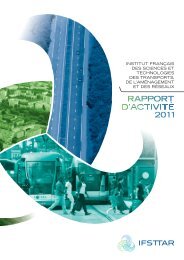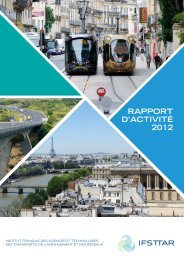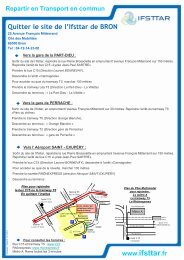french institute of science and technology for transport ... - Ifsttar
french institute of science and technology for transport ... - Ifsttar
french institute of science and technology for transport ... - Ifsttar
You also want an ePaper? Increase the reach of your titles
YUMPU automatically turns print PDFs into web optimized ePapers that Google loves.
2_SCIENTIFIC AND TECHNICAL ACTIVITIES<br />
Continuous health<br />
report<br />
Launched in 2008, the COMPOSI-GeC project aims to<br />
develop composite materials whose core is instrumented<br />
with fibre optic sensors.<br />
62<br />
This instrumentation will produce a continuous diagnosis<br />
<strong>of</strong> structural health. Amongst other things, this will allow<br />
us to make better decisions about the appropriate time <strong>for</strong><br />
maintenance.<br />
COMPOSI-GeC is part <strong>of</strong> the DECID2 project (Intelligent<br />
Composite Material Demonstrator with a Dual Structural Health<br />
Diagnosis Capacity) which is run by a consortium (1) that is<br />
planning to build a demonstration rig <strong>for</strong> September 2012.<br />
This will measure 20m x 3.5m <strong>and</strong> be made from composite<br />
materials with dual instrumentation consisting <strong>of</strong> fibre optic<br />
sensors <strong>and</strong> ultrasonic patches.<br />
In order to <strong>for</strong>esee future research needs, the consortium will<br />
build an open air ageing test rig at IFSTTAR’s Nantes site <strong>and</strong><br />
another demonstrator that is identical to the first.<br />
One <strong>of</strong> the DECID2 project’s deliverables is a fibre optic sensor<br />
with a smaller diameter (80μm) than most <strong>of</strong> those on the<br />
market (125μm), which facilitates the monitoring <strong>of</strong> structures.<br />
This fibre has been successfully inserted into long structural<br />
shapes made from composite materials. The fatigue durability<br />
<strong>of</strong> these materials has been tested at different temperatures<br />
(1) The consortium consists <strong>of</strong> manufacturers - ETPO, DFC, IDIL, IX Fiber,<br />
SYNERVIA, <strong>and</strong> laboratories - CETIM, Larmaur (Université de Rennes 1),<br />
GEM (École Centrale de Nantes) <strong>and</strong> IFSTTAR.<br />
(-60°C, ambient temperature <strong>and</strong> 60°C) <strong>and</strong> under dense UV<br />
radiation (in collaboration with the NIST, Maryl<strong>and</strong>, USA).<br />
The goal is to evaluate the real structural capacities <strong>of</strong> intelligent<br />
composite materials.<br />
@ CONTACT<br />
monssef.drissi-habti@ifsttar.fr<br />
A specimen <strong>of</strong> instrumented composite<br />
material with a fibre optic core<br />
subjected to fatigue <strong>and</strong> flexural testing.<br />
Specific test facility<br />
developed by IFSTTAR<br />
<strong>for</strong> the full-scale<br />
fatigue testing <strong>of</strong> this<br />
type <strong>of</strong> structure.<br />
New railway tracks<br />
without ballast<br />
The FUI-NBT (New Ballastless Track project is backed<br />
by the i-Trans competitiveness cluster <strong>and</strong> is an attempt<br />
to develop a French design <strong>for</strong> rail track that is laid on<br />
concrete slabs. The specifications <strong>for</strong> this include : usability<br />
<strong>for</strong> freight at low speed <strong>and</strong> passengers at high<br />
speed, a design life <strong>of</strong> 100 years, minimum maintenance<br />
<strong>and</strong> a laying speed <strong>of</strong> 1km/day. The project has a budget<br />
<strong>of</strong> €1.6M.<br />
IFSTTAR is playing an active part in this project with its<br />
industrial partners RAILTECH, ALSTOM, VOSSLOH <strong>and</strong> RFF,<br />
initially <strong>for</strong> the design <strong>of</strong> the slabs. The project is currently at<br />
the laboratory validation stage. For this, IFSTTAR has developed<br />
a specific test facility <strong>for</strong> the full-scale fatigue testing <strong>of</strong><br />
this type <strong>of</strong> structure.<br />
This novel facility makes it possible to apply cyclic mechanical<br />
loading <strong>and</strong> thermal gradients simultaneously to the tested<br />
slabs. The per<strong>for</strong>mance <strong>of</strong> this facility permit loading at 5Hz<br />
with axle loads <strong>of</strong> up to 40 tonnes <strong>and</strong> maximum thermal<br />
gradients in the concrete slabs <strong>of</strong> 0.8 °C/cm. The first results<br />
correlate well with the models. Fatigue tests are to be<br />
per<strong>for</strong>med up to 10 million cycles in order to validate the last<br />
phase <strong>of</strong> the project which consists <strong>of</strong> the construction <strong>of</strong> a<br />
1km section on a real railway line in early 2013.<br />
@ CONTACT<br />
louis-marie.cottineau@ifsttar.fr,<br />
jean-michel.piau@ifsttar.fr & thierry.sedran@ifsttar.fr<br />
ifsttar French Institute <strong>of</strong> Science <strong>and</strong> Technology <strong>for</strong> Transport, Development <strong>and</strong> Networks






![Trajectoire le magazine n°3 - Juillet 2012 [.pdf] - Ifsttar](https://img.yumpu.com/30038493/1/190x253/trajectoire-le-magazine-na3-juillet-2012-pdf-ifsttar.jpg?quality=85)

